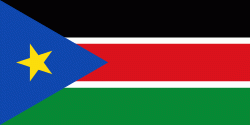Eastern Nile State (Central Upper Nile)
Eastern Nile was a state in South Sudan that existed between 2 October 2015 and 14 January 2017 when it was divided into Central Upper Nile State and Northern Upper Nile State. It was located in the Greater Upper Nile region and it was part of the former states of Upper Nile and Jonglei. The state bordered the states of Eastern Bieh, Latjoor, Western Bieh, Western Nile, and the country of Ethiopia to the east.
Before Eastern Nile State was formed, its territory was in the former states of Upper Nile and Jonglei. On 2 October 2015, President Salva Kiir issued a decree establishing 28 states in place of the 10 constitutionally established states. The decree established the new states largely along ethnic lines. A number of opposition parties and civil society groups challenged the constitutionality of the decree. Kiir later resolved to take it to parliament for approval as a constitutional amendment. In November the South Sudanese parliament empowered President Kiir to create new states. Chol Thon Balook was appointed Governor on 24 December 2015. On 14 January 2017 Eastern Nile State was divided into Central Upper Nile State and Northern Upper Nile State.
Before Eastern Nile State was formed, its territory was in the former states of Upper Nile and Jonglei. On 2 October 2015, President Salva Kiir issued a decree establishing 28 states in place of the 10 constitutionally established states. The decree established the new states largely along ethnic lines. A number of opposition parties and civil society groups challenged the constitutionality of the decree. Kiir later resolved to take it to parliament for approval as a constitutional amendment. In November the South Sudanese parliament empowered President Kiir to create new states. Chol Thon Balook was appointed Governor on 24 December 2015. On 14 January 2017 Eastern Nile State was divided into Central Upper Nile State and Northern Upper Nile State.
Map - Eastern Nile State (Central Upper Nile)
Map
Country - South_Sudan
 |
 |
| Flag of South Sudan | |
South Sudan gained independence from Sudan on 9 July 2011, making it the most recent sovereign state or country with widespread recognition as of 2023. It includes the vast swamp region of the Sudd, formed by the White Nile and known locally as the Bahr al Jabal, meaning "Mountain River". Sudan was occupied by Egypt under the Muhammad Ali dynasty and was governed as an Anglo-Egyptian condominium until Sudanese independence in 1956. Following the First Sudanese Civil War, the Southern Sudan Autonomous Region was formed in 1972 and lasted until 1983. A second Sudanese civil war soon broke out in 1983 and ended in 2005 with the Comprehensive Peace Agreement. Later that year, southern autonomy was restored when an Autonomous Government of Southern Sudan was formed. South Sudan became an independent state on 9 July 2011, following 98.83% support for independence in a January 2011 referendum. It has suffered ethnic violence and endured a civil war characterized by rampant human rights abuses, including various ethnic massacres and killings of journalists by various parties to the conflict from December 2013 until February 2020, when competing combat leaders Salva Kiir Mayardit and Riek Machar struck a unity deal and formed a coalition government, paving the way for refugees to return home.
Currency / Language
| ISO | Currency | Symbol | Significant figures |
|---|---|---|---|
| SSP | South Sudanese pound | £ | 2 |
| ISO | Language |
|---|---|
| EN | English language |















